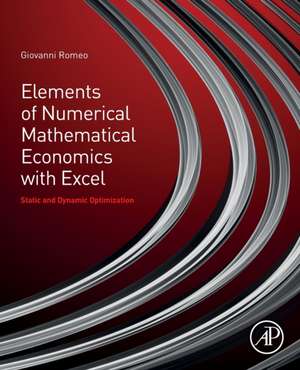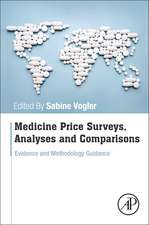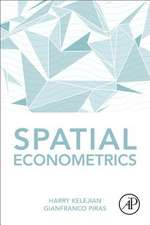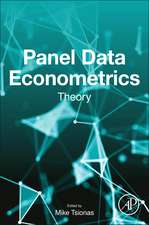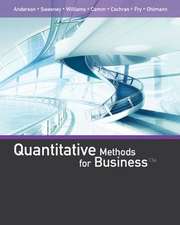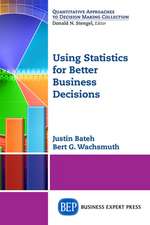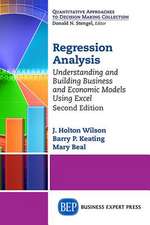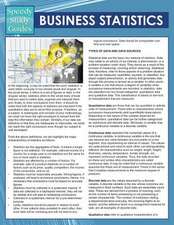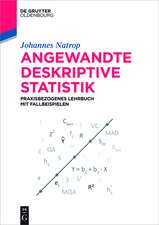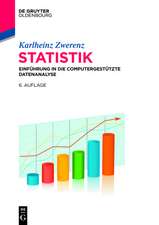Elements of Numerical Mathematical Economics with Excel: Static and Dynamic Optimization
Autor Giovanni Romeoen Limba Engleză Paperback – 26 noi 2019
After introducing the fundamental tools of mathematical economics, the book explores the classical static optimization theory of linear and nonlinear programming, applying the core concepts of microeconomics and some portfolio theory. This provides a background for the more challenging worksheet applications of the dynamic optimization theory. The book also covers special complementary topics such as inventory modelling, data analysis for business and economics, and the essential elements of Monte Carlo analysis.
Practical and accessible,Elements of Numerical Mathematical Economics with Excel: Static and Dynamic Optimizationincreases the computing power of economists worldwide. This book is accompanied by a companion website that includes Excel examples presented in the book, exercises, and other supplementary materials that will further assist in understanding this useful framework.
- Explains how Excel provides a practical numerical approach to optimization theory and analytics
- Increases access to the economic applications of this universally-available, relatively simple software program
- Encourages readers to go to the core of theoretical continuous calculations and learn more about optimization processes
Preț: 487.40 lei
Preț vechi: 643.27 lei
-24% Nou
93.27€ • 97.57$ • 77.47£
Carte tipărită la comandă
Livrare economică 27 martie-10 aprilie
Specificații
ISBN-10: 0128176482
Pagini: 816
Dimensiuni: 191 x 235 x 40 mm
Greutate: 1.38 kg
Editura: ELSEVIER SCIENCE
Public țintă
Data analysts and research scientists worldwide working in data analytics companies, financial institutions, and other groups that handle economic dataCuprins
Part I Excel And Fundamental Mathematics For Economics 1. Excel VBA, Solver and Other Advanced Worksheet Tools 2. Univariate and Multivariate Calculus 3. Elements of Linear Algebra 4. Mathematics for Dynamic Economic Models
Part II Static Optimization 5. Classical Static Nonlinear Optimization Theory 6. Microeconomic Theory in a Static Environment 7. Linear Programming 8. Nonlinear Optimization Applied to the Portfolio Theory
Part III Dynamic Optimization 9. Calculus of Variations (COV) 10. Theory of Optimal Control (OC) 11. Discrete Dynamic Programming (DDP)
Part IV Special Topics 12. Dynamic Production Planning and Inventory Modelling 13. Data Analysis for Business and Economics 14. Essential Monte Carlo Analysis
Descriere
Elements of Numerical Mathematical Economics with Excel: Static and Dynamic Optimization shows readers how to apply static and dynamic optimization theory in an easy and practical manner, without requiring the mastery of specific programming languages that are often difficult and expensive to learn. Featuring user-friendly numerical discrete calculations developed within the Excel worksheets, the book includes key examples and economic applications solved step-by-step and then replicated in Excel.
After introducing the fundamental tools of mathematical economics, the book explores the classical static optimization theory of linear and nonlinear programming, applying the core concepts of microeconomics and some portfolio theory. This provides a background for the more challenging worksheet applications of the dynamic optimization theory. The book also covers special complementary topics such as inventory modelling, data analysis for business and economics, and the essential elements of Monte Carlo analysis.
Practical and accessible, Elements of Numerical Mathematical Economics with Excel: Static and Dynamic Optimization increases the computing power of economists worldwide. This book is accompanied by a companion website that includes Excel examples presented in the book, exercises, and other supplementary materials that will further assist in understanding this useful framework.
- Explains how Excel provides a practical numerical approach to optimization theory and analytics
- Increases access to the economic applications of this universally-available, relatively simple software program
- Encourages readers to go to the core of theoretical continuous calculations and learn more about optimization processes
